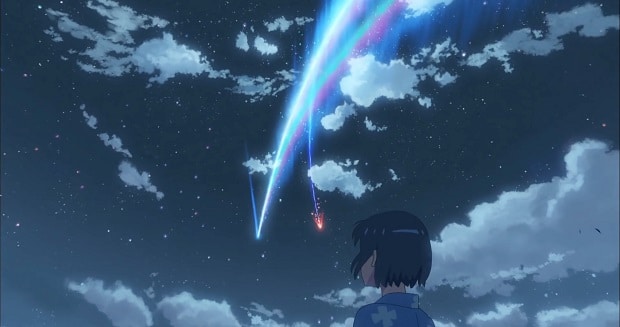
If there was one thing that didn’t suck horribly about 2016 it was the year’s selection of genre films. As ever, I’ve been immensely privileged to see a whole load of upcoming films as well as general releases, and so my favourites list is populated by a mix of films that were on general release and others that will be in UK cinemas and homes during 2017. I’ve broadly here stuck to films which are ‘genre’, with an emphasis on horror, but even so it was a struggle narrowing things down.
Below is my ‘top ten’, but also an embarrassingly long list of honourable mentions. Some of these films will be ones you’ve already heard tons about, but hopefully there are one or two films in here to pique your interest a-new. Take from the number of films here what you will – either I’m just not very discerning or it was a really good year for genre films. I’m inclined to believe it’s the latter.
(As for the year’s big titles that I’ve yet to see – and there are plenty of those too – it’s a much easier job to narrow it down to the one that I’m most excited to eventually see in 2017 – Shin Godzilla.)
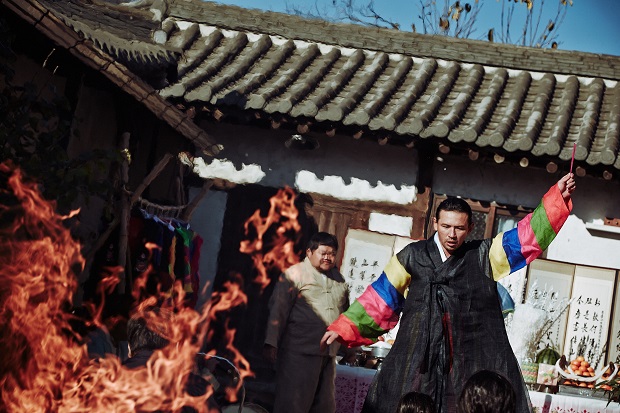 THE WAILING (Na Hong-Jin, South Korea, 2016)
THE WAILING (Na Hong-Jin, South Korea, 2016)
By far my favourite of the year, The Wailing is a juggernaut of a film, effortlessly blending genres to devastating effect. Part-police procedural and part-possession horror, the film also boasts a wickedly dark sense of humour and an element of social commentary. Set in a small Korean town by the name of Goksung, the local police force is baffled by a series of strange murders and hysterical behaviour. The locals point their finger at a recently arrived Japanese man (Jun Kunimura), who lives on the out-skirts of the village. Police officer Jong-Goo (Kwak Do-Won) investigates, and finds himself increasingly involved in the mystery, most of all when his own young daughter Hyo-Jin (Kim Hwan-Hee) begins to exhibit behaviour similar to those who have been dying. Enlisting the help of charismatic shaman, Il-Gwang (Hwang Jung-Min), Jong-Goo discovers that dark forces are at work in his village. When a mysterious young woman, Moo-Myeong (Chun Woo-Hee), appears with warnings, the reality of what is unfolding becomes increasingly frightening and confusing for an increasingly desperate Jung-Goo.
The Wailing is a magnificent horror epic, running at a massive 156 minutes and yet whizzing by in a few quickened heartbeats. Director and writer Na Hong-Jin is masterful in his portrayal of a small town beset by evil, through skilled direction and a wonderful cast of characters. At its centre Kwak Do-Won portrays a complex everyman. Jong-Goo isn’t always entirely likeable, but he’s a protagonist we wholly root for, even when he makes stupid decisions. Veteran Japanese actor Jun Kunimura is electric as the stranger, while Hwang Jung-Min’s enigmatic Il-Gwang threatens to steal the show – particularly with the film’s centre-piece ritual sequence. Kim Hwan-Hee has won deserving praise for her role as Hyo-Jin, the funny and sweet natured little girl who soon enough turns into a profanity-spitting, all-consuming, contorted possessee. The film’s rural setting provides an intimidating and beautiful backdrop, particularly in early rain-drenched scenes. It also adds to the sense of foreboding that permeates the film, right through to its final frames, with such a lush and primeval setting.
The film’s horror is really aided by its sense of humour and its sense of place. Several Korean films in the past year or two have been tackling the country’s past occupation by Japan (see also The Silenced, which I’m told is finally on Netflix now), and it’s no throw-away detail that the citizens of Goksung so quickly point their fingers at the Japanese stranger. You’ll have to see the film in order to determine whether or not they’re correct in their assumptions, but the film offers a subtle take on historical and current tensions. For all The Wailing’s bleakness, it’s also hugely funny and entertaining – even at its most tense it can skilfully crack out a scene of physical humour without interrupting the flow of the film. For all the disparate elements of the films – from serial murder, to domestic drama, to revenge and humour – what makes The Wailing so successful for me is that it never shies away from being a horror film. It all comes together in the mix to make what for me is not only the best horror film of the year, but easily my favourite film of 2016.
The Wailing is available on a variety of streaming platforms now, and released on DVD by Kaleidoscope Pictures on January 30th.
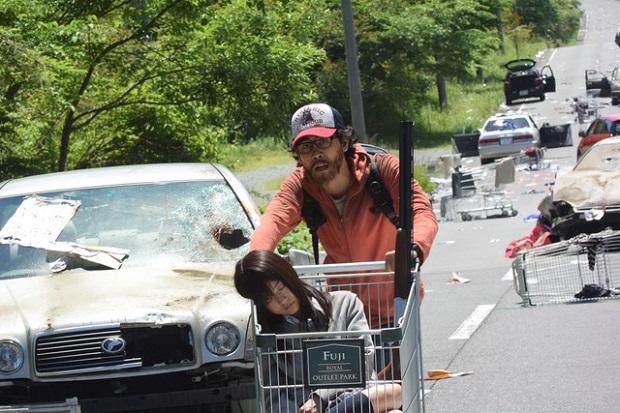 I AM A HERO (Shinsuke Sato, Japan, 2016)
I AM A HERO (Shinsuke Sato, Japan, 2016)
Keep an eye out for I Am A Hero. It’s a film that’s not made it over to the UK yet (with much personal frustration at that fact, believe you me), but it’s played a number of international genre festivals this year after world premiering at last year’s Sitges Festival and going on release domestically in April. An adaptation of a very popular manga, I Am A Hero is yet another Japanese step-up in the zombie film, following last year’s hugely entertaining Deadman Inferno. The central character of the film is Hideo (Yô Ôizumi), a manga artist, who finds himself witnessing the onset of the zombie apocalypse, when a virus, named ZQN, turns people savage and superhuman. Running away from the city with lost schoolgirl Hiromi (Kasumi Arimura), Hideo finds a group of survivors in the suburbs, including Nurse Yabu (Masami Nagasawa), who believes she can extract an antidote from Hiromi. Soon enough the survivors’ stronghold (an out of town retail park, naturally) are beset by the infected and must defend themselves at all costs, with an unlikely hero emerging.
This is no tired re-tread of Romero’s greatest works nor yet another descendant of 28 Days Later or Shaun of the Dead. From the outset it’s evident that Sato’s adaptation does not lose its manga roots, nor does it shy away from injecting even the most horrifying of moments with a massive dose of humour – such as an early scene where Hideo witnesses his fiancée turn into a zombie. Hideo is a great loser-protagonist, and Ôizumi’s performance really grounds the film, particularly given its really ridiculous set-pieces. I mean ridiculous in a good way, of course, and it all builds up to a phenomenal action climax. If there’s one down-side to I Am A Hero, it’s that it ends very suddenly, gearing up for the inevitable sequel, but that doesn’t tarnish a truly great new zombie film which achieves freshness in a generally stale sub-genre.
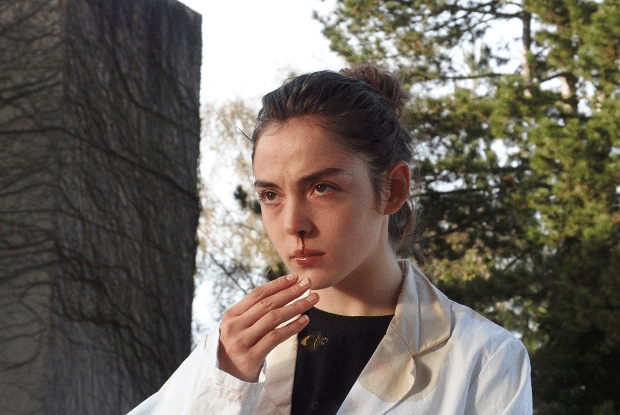 RAW (Julia Ducournau, France, 2016)
RAW (Julia Ducournau, France, 2016)
The darling of many horror fans this year, Raw’s played nearly all the festivals going, and it’ll no doubt receive yet another wave of hype and anticipation when it goes on general release in the spring. The hype surrounding the film is almost unfortunate, as for me it really emphasises the wrong elements of the film: sure, people have had physical reactions to the film (and I have first-hand accounts of this being the case!), but it’s not the gore or the violence of Julia Ducournau’s incredible coming-of-age films that makes it such a stand out of the year, but rather its tremendous black humour. The film sees vegetarian Justine (Garance Marillier) join vet school and ingesting raw meat during a hazing ritual. Egged on by her wayward sister Alexia (Ella Rumpf), Justine discovers cravings and urges developing in her new environment. The triumph of Raw is the humour derived from Justine’s increasingly extreme behaviour, and particularly in her relationship with her sister. Much like Ginger Snaps before it, Raw is a canny look at female relationships and adolescence, and uses violence and humour both to excellent effect.
Raw is released by Universal Pictures later this year.
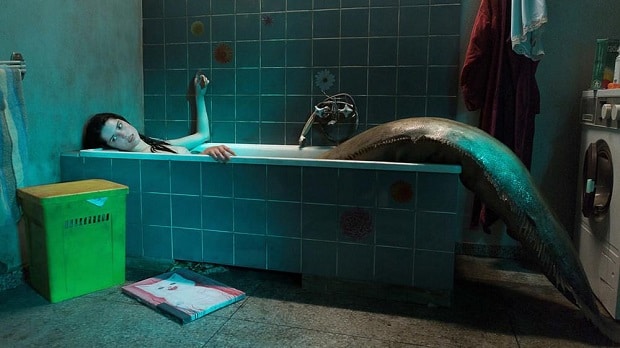 THE LURE (Agnieszka Smoczynska, Poland, 2015)
THE LURE (Agnieszka Smoczynska, Poland, 2015)
It’s fair to say that The Lure had me at ‘mermaid disco,’ but luckily there’s much more to the film than that. A captivating debut from Agnieszka Smoczynska, the film weaves the tale of two sisters, Silver (Marta Marzuek) and Golden (Michalina Olszanska), who meet a rock band on the shore of their lake. Looking for a new life, the sisters follow the band and join a Warsaw night club, working their way up from strippers to singers. In this new environment, and partially under the wing of the club’s veteran singer (Kinga Preis), the sisters find themselves having very different interests in the human world.
The Lure is a welcome mermaid-centric film, depicting the sisters as cunning, alluring, and blood-thirsty. They communicate with each other using a dolphin-like, semi-psychic language, which is a magnificent addition to their physical monstrosity – though they may appear human, the sisters’ natural state includes large, dangerous and oozing tails. Much like Raw, the film can be seen as a coming-of-age story, but it’s also an immigrant tale, the sisters already pining for a new life before they even meet the rock band that takes them to Warsaw.
The ending of the film wasn’t quite as I’d hoped for, but it’s an inevitable and satisfying close to a wildly entertaining and quite refreshing film. The sparklingly bleak Warsaw setting is a great backdrop to a film that, minus the mermaids, could easily have been a stark social-realist film. That film would not have been nearly as entertaining, nor would it have made its points so well.
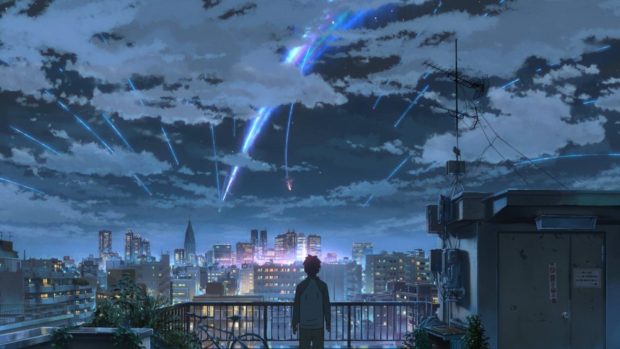 YOUR NAME (Makoto Shinkai, Japan, 2016)
YOUR NAME (Makoto Shinkai, Japan, 2016)
Your Name has proved to be a global sensation this year, not least of all in Japan, where it’s been breaking all sorts of box office records and snapping at the heels of Studio Ghibli’s otherwise unshakeable dominance of popular anime. Just like some of Ghibli’s best, Your Name is a winning combination of fantasy and real life, which is coupled with some truly jaw-dropping animation.
High schooler Mitsuha lives out in the sticks where she longs for a more exciting life in the city. Taki lives in Tokyo, wakes one morning to find himself inhabiting the body of a girl. Over the next few days, Mitsuha and Taki come to realise that what they think are dreams are nothing of the sort – they’re switching bodies, seemingly at random. The two teens leave messages for each other in journals and phone messages, getting to know each other and starting to play roles in each other’s life. As they try to find a way to stop what’s going on, their taste of a different way of living leads them to reassess their own situations.
The animation in Your Name really does rank up there with some of the best I’ve ever seen. While some of the more fantastical elements are wonderfully realised, the real beauty of the film is the animation of day-to-day life – food, busy commutes, leaves on trees. Equally as impressive as the animation is the story, and even if you can see what’s coming it’s still an effective teen drama, a love story, a commentary on modern life. As with so much of the best anime, its main characters might be children, but it’s by no means just a children’s or teens’ film.
Your Name will be released on Blu-ray and DVD later this year by Anime Ltd.
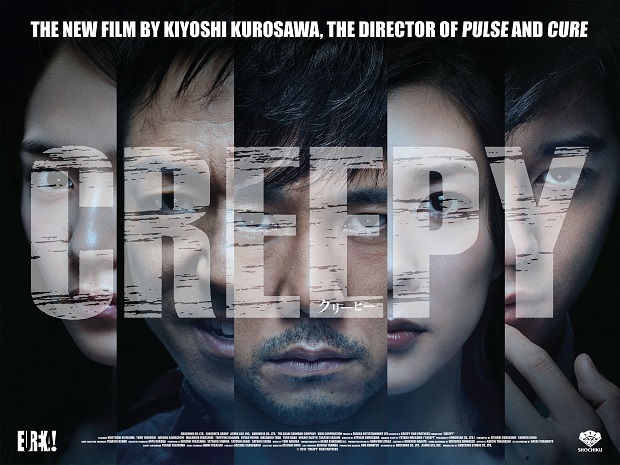 CREEPY (Kiyoshi Kurosawa, Japan 2016)
CREEPY (Kiyoshi Kurosawa, Japan 2016)
Kiyoshi Kurosawa will have a central place to the history of modern J-horror with his film Pulse from 2001. He’s a director who’s taken in many types of films in his career, and in recent years moved away from the genre fare that established him (although last year’s romantic drama Journey to the Shore is about a ghost, so…). With this year’s Creepy he revisits serial killer horror and does so with real aplomb and skill: it’s easily one of the best directed horror films of the year.
Retired police detective Koichi Takakura (Hidetoshi Nishijima) has moved to a quiet neighbourhood with his wife, Yasuko (Yuko Takeguchi), and taken on new work as a university lecturer. While Yasuko tries to befriend the neighbours, primarily the strange Mr. Nishino (Teruyuki Kagawa), Koichi is drawn back into a cold case by former and new colleagues. As he investigates the disappearance of three members of the same family, he begins to realise that the mystery he’s investigating is leading him closer and closer to home.
The two major strengths of Creepy are its core performances and its direction. The whole cast is very strong, and yet even so Teruyuki Kagawa steals the show as the neighbour, Mr. Nishino. I hope it doesn’t spoil too much to say that his performance is extremely, well, creepy, but Kagawa ensures that Mr. Nishino is just enough sympathetic to keep the audience on its toes. Meanwhile, Kurosawa’s stark direction manages to instil even the most mundane of scenes with a sense of dread, so much so that I found myself on the edge of my seat before anything too awful had really happened.
The film is based on a novel by Yutaka Maekawa, I’ve seen plenty criticisms of the film being too far-fetched to be believable. Valid criticism indeed, but there’s another clear influence on the film, and that’s the case of real-life serial killer Futoshi Matsunaga. Don’t look him up before seeing the film though…
Creepy is released on Blu-ray on January 23rd by Eureka.
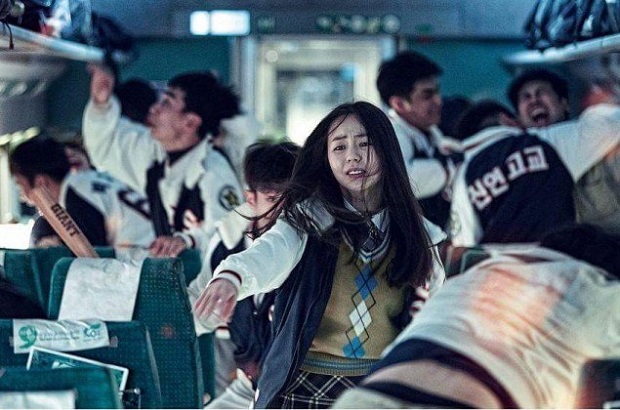 TRAIN TO BUSAN (Yeon Sang-Ho, South Korea, 2016)
TRAIN TO BUSAN (Yeon Sang-Ho, South Korea, 2016)
It’s been pleasing to see two big break-out horror films from Korea this year, and Train to Busan really seemed to take the world by storm following its box-office smashing domestic performance. Its boils down to being a ‘zombies on a train’ film, and while it doesn’t necessarily do anything particularly new with the zombies themselves, its cast of characters is immensely charming, and so the thrills of the film take hold to the very last frame.
Central to the film is Gong Yoo’s Seok-woo, a father taking his young daughter Su-an (Kim Su-an) to see her mother. This central relationship is the emotional core of the film, particularly as Jin-hee interacts with other passengers on the train, notably father-to-be Sang-hwa, played by Ma Dong-seok, who manages to steal the show from everyone else with an endearing tough-guy act. The film throws together stereotypical characters but does unexpected things with them, such as the teen couple and heroic school baseball team. The film’s ‘villain’ – aside from the zombies –is the duplicitous official Yon-suk (Kim Eui-sung), who turns passengers on the train against each other and lies in order to save his own skin, at the expense of others. I’m not sure if the film was purposefully passing any comment on the corruption in Korean government and its agencies, but in light of more recent revelations there it’s hard not to draw some parallels.
Similar to I Am A Hero, the zombies of Train to Busan’s world are wildly entertaining in their ability to withstand trauma (except to the head) and their incessant need to seek out flesh. There are a number of action set-pieces which make inventive use of the zombies, and yet the humour often derived from them never crosses over into distraction from the main point of almost any zombie film: the survival (or not) of its protagonists. By the film’s closing moments, we’re so invested in the passengers that the pile-on of zombie action becomes entirely secondary.
Train to Busan is released on DVD and Blu-ray on February 27th by Studiocanal.
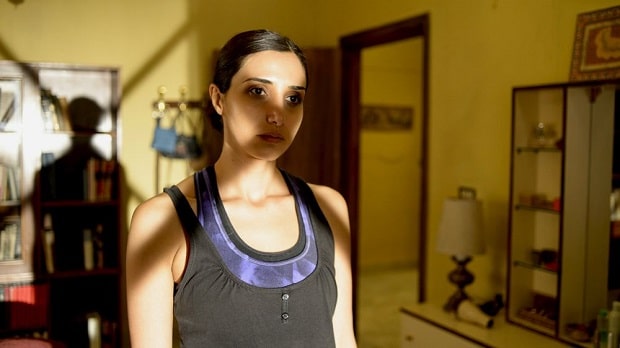 UNDER THE SHADOW (Babak Anvari, Iran/Qatar/UK, 2016)
UNDER THE SHADOW (Babak Anvari, Iran/Qatar/UK, 2016)
I don’t think anyone’s going to pretend that two films count as a resurgence, but it was exciting to see another Iranian horror film this year, following Ana Lily Amirpour’s The Girl Walks Home At Night. While Amirpour’s film took a more fantastical approach to its setting, Under the Shadow is a horror film placed firmly within a historical moment of post-revolutionary Iran, at war with Iraq. Leading the film is Shideh (Narges Rashidi), a former medical student forced into the life of a house wife after being refused re-entry to her studies because of her supposed involvement with political groups during the revolution. Her husband, Iraj (Bobby Naredi), is a doctor, and gets called away by the military to work in an area of intense fighting. Meanwhile, Tehran becomes increasingly unsafe, with shelling becoming regular, and many of Shideh’s neighbours begin to leave the apartment building and the city. Shideh, however, is determined to stay, not least of all because her daughter Dorsa (Avin Manshadi), is behaving strangely and extremely attached to her lost doll. As they find themselves alone in the building, events take a turn for the worse.
For me, what’s most impressive about Under the Shadow is that it doesn’t shy away from really being a horror film – while it takes in many psychological issues and makes its social comments, for me it’s also firmly a horror film. It successfully visualises its key monster in a way that doesn’t become silly or undermine the tension that’s been built up, and I think that is a real feat to pull off. It’s a wonderful meld of genres, and a breath of fresh air to a familiar scenario.
Under the Shadow is out now on digital and VOD, and is released on DVD January 23rd by Signature Entertainment.
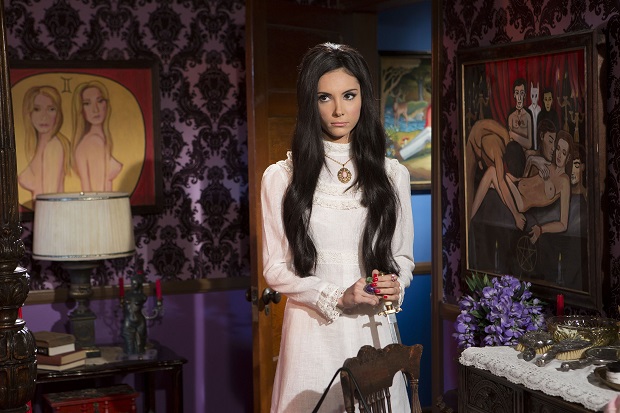 THE LOVE WITCH (Anna Biller, USA, 2016)
THE LOVE WITCH (Anna Biller, USA, 2016)
One of the big favourites for a lot of people from 2015-2016 was David Eggers’ The Witch (or The VVitch, if you prefer), a film which left me rather cold (though I didn’t quite have the ideal viewing conditions for it, so I’m still open to enjoying it). Witches are a movie ‘monster’ that I think are far too often over-looked, so hearing about The Love Witch, a film in which a woman uses love magic to try to find the man of her dreams, was a delight.
The Love Witch is almost definitely this year’s most beautiful film. It’s a huge achievement by filmmaker Anna Biller, whose attention to detail is by far the film’s biggest asset. Not only in her own myriad contributions – her credits on the film are far greater than ‘just’ writer-director – but in her choices of collaborators. Biller has spoken at length about the importance of her cinematographer M. David Mullen, for example, as well as her very close work casting with lead actress Samantha Robinson. Robinson is really resplendent in what could have been an unforgiving role, and it’s credit to both her and Biller for really fleshing out such a complex protagonist.
It might seem pig-headed to say so, but part of me likes The Love Witch even more because of its inevitable turning-off of some people. It’s a long film, and it doesn’t pull any punches nor spell things out for the viewer. It’s as admirable as it is enjoyable, to me, and well deserves all the praise it’s been receiving.
The Love Witch is released in the UK in cinemas, VOD and digital this March by FrightFest Presents.
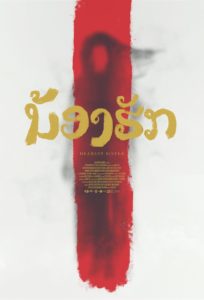 DEAREST SISTER (Mattie Do, Laos/France/Estonia, 2016)
DEAREST SISTER (Mattie Do, Laos/France/Estonia, 2016)
It’s a real pleasure to see a filmmaker go from strength to strength, and when it’s a filmmaker as independent and trail-blazing as Mattie Do, it’s an even greater pleasure. With her second film, Do builds on the promise of her 2013 debut, Chanthaly. In some ways there are similarities in the two films – it’s another ghost story, embracing Lao culture both traditional and modern – but in every way Dearest Sister is a step-up. Nok (Amphaiphun Phommapanya) is a young woman from a rural village who moves to the Lao capital, Vientiane, in order to live with her cousin Ana (Vilouna Phetmany) and her Estonian husband Jakob (Tambet Tuisk). Ana has recently lost her sight, and Nok discovers that Ana has developed a strange psychic connection to the dead. While Jakob is distracted with his own nefarious business dealings, Nok begins to take advantage of Ana’s condition for her own gain.
The central relationship between Nok and Ana is a wonderfully complex and twisted one, and is performed with a lovely subtlety by Phommapanya and Phetmany. It’s a slow build, for sure, but the film’s climax is beautifully devastating, if you see it coming or not (so to speak). The film might be a bit too subtle or light on the ‘horror’ for some people, but I think we can still consider a film to be horror even if it doesn’t scare us – it might move us in some other dark, or even sympathetic, way. Nok and Ana experience something wholly supernatural, and have unravelled by the film’s end. That’s certainly horror enough for me.
Very honourable mentions:
A Dark Song (Liam Gavin, Ireland, 2016)
Captain America: Civil War (The Russo Brothers, USA, 2016)
Harmony (Michael Arias & Takashi Nakamura, Japan, 2015)
Headshot (The Mo Brothers, Indonesia, 2016)
I Am Not A Serial Killer (Billy O’Brien, Ireland, 2016)
Karate Kill (Kurando Mitsutake, Japan/USA, 2016)
Rogue One: A Star Wars Story (Gareth Edwards, USA, 2016)
Sadako vs Kayako (Kōji Shiraishi, Japan, 2016)
The Alchemist Cookbook (Joel Potrykus, USA, 2016)
The Autopsy of Jane Doe (Andre Ovredal, USA, 2016)
The Boy and the Beast (Mamoru Hosoda, Japan, 2015)
The Girl With All The Gifts (Colm McCarthy, UK, 2016)
The Inerasable (Yoshihiro Nakamura, Japan, 2015)
The Laundryman (Chung Lee, Taiwan, 2015)
The Lighthouse (Chris Crow, UK, 2016)
Women Who Kill (Ingrid Jungermann, USA, 2016)